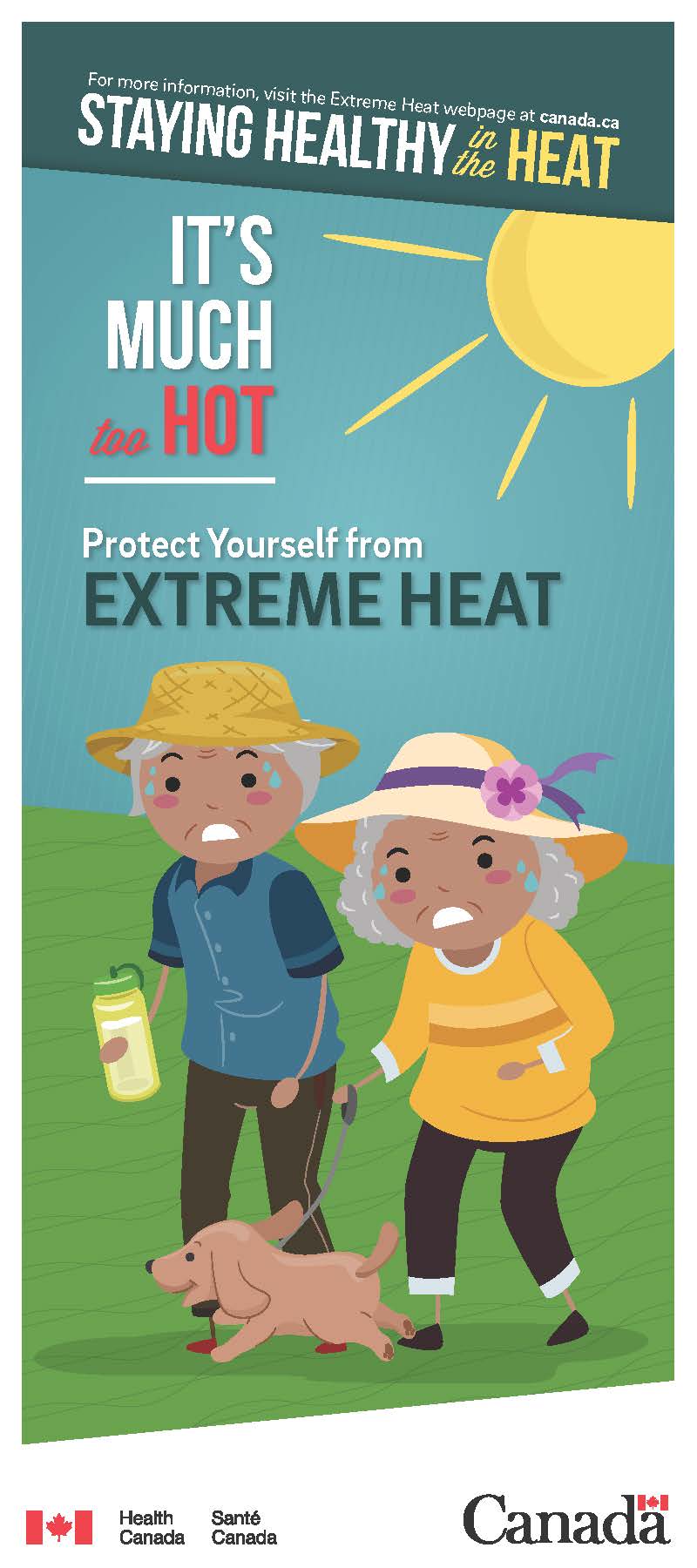It's much too hot! Protect yourself from extreme heat

Download the alternative format
(PDF format, 2.42 MB, 12 pages)
Organization: Health Canada
Date published: 2024
PRINT Cat.: H144-61/2020E
ISBN: 978-0-660-31439-6
PDF Cat.: H144-61/2024E-PDF
ISBN: 978-0-660-73112-4
Pub.: 240476
Order a Copy
For further information or to obtain additional copies, please contact:
Publications
Health Canada
Ottawa, Ontario K1A 0K9
Tel.: 613-954-5995
Fax: 613-941-5366
E-Mail: hc.publications-publications.sc@canada.ca
Table of Contents
- Know your risks
- Prepare for the heat
- Pay close attention to how you and those around you feel
- Stay hydrated
- Keep your home cool
- Avoid exposure to very hot temperatures
- Additional resources
Know your risks
Hot temperatures can be dangerous, especially if you have:
- breathing difficulties
- heart problems
- hypertension
- kidney problems
- a mental illness
- Parkinson's disease
If you are taking medication or have a health condition, ask your doctor or pharmacist if it increases your health risk in the heat and follow their recommendations.
Prepare for the heat
Tune in regularly to local weather forecasts and alerts so you know when to take extra care.
Arrange for regular check-ins by family, friends, and neighbours during very hot days in case you need assistance. Follow the advice of your local public health authority and adjust your behaviours and routines accordingly. You can also arrange for regular check-ins by phone or video.
If you have an air conditioner, make sure it works properly before the hot weather starts. Otherwise, find an air-conditioned spot close by where you can cool off during hot days. This will help you cope with the heat better.
Heat illness
Heat illnesses include heat stroke, heat exhaustion, heat fainting, heat edema (swelling of hands, feet and ankles), heat rash and heat cramps (muscle cramps). Heat illnesses can affect you quickly and are mainly caused by over-exposure to heat or over-exertion in the heat.
Pay close attention to how you and those around you feel
Watch for symptoms of heat illness, which include:
- dizziness or fainting
- nausea or vomiting
- headache
- extreme thirst (dry mouth or sticky saliva)
- rapid breathing and heartbeat
- decreased urination with unusually dark yellow urine
If you experience any of these symptoms during hot weather, immediately move to a cool place and drink water.
Stay hydrated
Drink plenty of water, before you feel thirsty to decrease your risk of dehydration. Thirst is not a good indicator of dehydration.
- Remind yourself to drink water by leaving a glass by the sink.
- Eat more fruits and vegetables as they have a high water content.
9-1-1
Heat stroke is a medical emergency! If you are caring for someone, such as a neighbour, who has a high body temperature and is either unconscious or confused, or has stopped sweating, call 911 or your local emergency number immediately.
WHILE WAITING FOR HELP, cool the person right away by:
- Moving them to a cool place.
- Applying cold water to large areas of the skin or clothing.
- Fanning the person as much as possible.
Keep your home cool
If you have an air conditioner, use it to keep cool.
- Prepare meals that don't need to be cooked in your oven. Try Canada's food guide's no-cook recipes.
- Block the sun by opening awnings and closing curtains or blinds during the day.
- If safe, open your windows at night to let cooler air into your home.
If your home is extremely hot:
- Take a break from the heat by spending time in a cool place. It could be a tree-shaded area, swimming pool or an air-conditioned spot such as a shopping mall, grocery store, place of worship or public library.
- Take cool showers or baths until you feel refreshed.
- Use a fan to help you stay cool and aim the air flow in your direction. Note: While fans can help you feel more comfortable, they are ineffective at cooling the body at temperatures over 35°C.
Avoid exposure to very hot temperatures
Never leave people or pets in your care inside a parked vehicle or in direct sunlight.
- Even on cooler days when the outside temperatures are moderate, the temperature inside a vehicle can be dangerously hot.
Reschedule or find alternatives
Reschedule or plan outdoor activities during cooler parts of the day.
- Before heading out, check the Air Quality Health Index (AQHI) in your area, if available— air pollution tends to be at higher levels during very hot days.
If you are in an area with mosquitoes or ticks, protect yourself with insect repellent:
- Use insect repellent that has DEET or icaridin.
- Follow the product instructions.
Avoid sun exposure
- Wear loose-fitting, light-coloured clothing made from breathable fabric.
- Shade yourself by wearing a wide-brimmed, breathable hat or using an umbrella.
- Tree-shaded areas can be cooler than the surrounding area.
- Limit your time in the sun.
Use a broad spectrum sunscreen that is SPF30 or higher and follow the product instructions. Remember, sunscreen will help protect you from the sun's ultraviolet (UV) rays but not from the heat.
Sunscreen and insect repellents can be used safely together. Apply the sunscreen first, then the insect repellent.